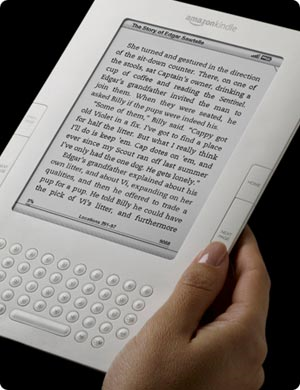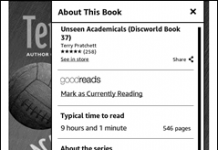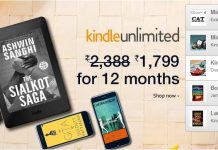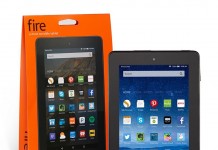 A couple of weeks ago I blogged a post by author Will Entrekin about why he felt Amazon’s Kindle Select program (in which authors give Amazon exclusivity over their work in return for getting paid for Kindle Prime subscriber e-library checkouts) was a very good deal. Now I see another post, by Christopher Wright on Eviscerati.org, about why self-publishing authors might want to stay far away.
A couple of weeks ago I blogged a post by author Will Entrekin about why he felt Amazon’s Kindle Select program (in which authors give Amazon exclusivity over their work in return for getting paid for Kindle Prime subscriber e-library checkouts) was a very good deal. Now I see another post, by Christopher Wright on Eviscerati.org, about why self-publishing authors might want to stay far away.
Wright compares Kindle Select to Michael Roberts’s MP3.com independent music distribution site, which allowed independent musicians (such as Wright) to upload mp3 tracks to catch the attention of the Internet audience.
That was, without question, the most fun I’ve ever had online. MP3.com started providing tools for musicians, including the ability to upload mp3 tracks and convert them into a CD — so you could sell your CD alongside the tracks you were giving away from free. No one had ever thought of this before. It was nuts. And the best part of it was meeting other musicians.
MP3.com set up forums and the musicians would talk, trade recording tips, talk about what kind of marketing worked and what didn’t, advertise shows, and organize meet-ups in the real world. The best part was it was completely cross-genre — I was a punk/noise musician but I was making friends with country musicians, house musicians, funk musicians, metal, hip-hop, gangsta rap… you name it. And I got exposed to music I never would have considered listening to before hand. I still carry most of those MP3’s around in my collection.
However, after the site went public, MP3.com instituted a “Payback for Playback” program, which split a pool of money among the artists whose tracks were most played—a very similar idea to the Kindle Select lending library. This program served as an apple of discord, Wright writes, effectively ending the camaraderie and leading a number of artists to try to game the system.
Wright sees history repeating itself with the Kindle Select program, and points out that Amazon already has problems with people trying to game the self-publishing system with plagiarized and duplicate content. He wonders how long it will be before the same thing happens with Kindle Select.
He also points out that giving Amazon exclusivity over works harms the publishing ecosystem as a whole. Even if Amazon is accounting for the lion’s share of income right now, keeping content off of its competitors handicaps the competitors’ ability to compete with Amazon.
In the end, whether authors go with Select or not is up to them, but it’s good to hear from all points of view on the issue. It remains to be seen whether Select is vulnerable to gaming or not. As Wright acknowledges in a postscript, the limitation to one book checkout per month for $80/yr Kindle Prime subscribers does restrict how badly the system can be abused, but he is not sure that necessarily removes the vulnerability.
































Thanks for this, Paul. I’ve been thinking about Kindle Select and this has decided me. Exclusivity for ebooks is not in anyone’s interests, even Amazon’s.
I have mixed feelings about KDP select. I think an author should consider giving it a try – it’s not forever it’s only for 90 days at a time-, but be diligent about assessing your personal results.
I put one of my books (Imperative, A Quinn Larson Quest) on KDP in December when it first came out, and I’ve taken advantage of the free promos (the last two days it will be free are Feb 28 and 29 – I figured both last days of the month are worth celebrating). I haven’t had spectacular results and I’ve had no borrows. I have decided not to renew the enrollment because I didn’t get the benefit I was looking for.
Now I have the knack of free campaigns, I can run them through Smashwords with coupons.
There are benefits if you can get the downloads and there are a lot of articles on the web about the ‘also bought’ standings etc. But, if you aren’t getting great results it doesn’t make a lot of sense to limit the places your book is available and can be marketed.
I agree with the above comment by Perry that KDP Select is a mixed bag. For one thing, I have noticed that my books are now doing better in Apple iBooks than in the Kindle store, and almost as well in the Sony store. This might be because I was apple to make one book free in iBooks and Sony for a while, by making it free on Smashwords (my best sales are the sequel to that book), or it might be because my science fiction novels have less competition in iBooks and Sony than on Kindle. In any event, I am taking a wait-and-see approach on KDP Select.
I decided to try it. I had a bunch of stuff on Goodreads, Smashwords, and Amazon and saw some sales. I wanted to give KDP a shot. I put everything in KDP to see how it would go and so far after two weeks not one single sale or borrow. The KDP system, for me personally, has destroyed my sales number. As of right now renewing would be a retarded business decision. However, we will see what I say in another two 1/2 months.